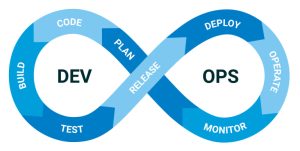
In the fast-paced world of software development, efficiency and collaboration are paramount. Enter DevOps, a groundbreaking approach that has transformed the way organizations build, deploy, and manage software. In this article, we’ll delve into the world of DevOps, exploring its principles, benefits, and its profound impact on the IT industry.
What is DevOps?
DevOps, a portmanteau of “development” and “operations,” is a cultural and technical movement that emphasizes collaboration and communication between software development (Dev) and IT operations (Ops) teams. It seeks to automate and streamline the software development and delivery process, making it faster and more efficient.
Key Principles of DevOps:
- Collaboration: DevOps fosters a culture of collaboration and shared responsibility. Developers and operations teams work closely together throughout the software development lifecycle.
- Automation: Automation is a core principle of DevOps. It involves automating repetitive tasks, such as testing, deployment, and infrastructure provisioning, to reduce errors and speed up the delivery process.
- Continuous Integration (CI): CI involves regularly merging code changes into a shared repository, followed by automated testing. This ensures that new code is continuously integrated and tested, leading to early bug detection.
- Continuous Delivery (CD): CD takes CI a step further by automatically deploying code changes to production or staging environments. This allows for more frequent and reliable releases.
- Monitoring and Feedback: DevOps places a strong emphasis on monitoring applications and infrastructure in real-time. Feedback from monitoring helps teams identify and address issues proactively.
Benefits of DevOps:
- Faster Time-to-Market: DevOps practices accelerate software development and deployment, enabling organizations to release new features and updates more rapidly.
- Improved Quality: Automation and continuous testing result in higher software quality and reliability, reducing the likelihood of critical errors.
- Enhanced Collaboration: DevOps promotes collaboration and communication among teams, breaking down silos and fostering a shared sense of ownership.
- Greater Efficiency: Automated processes and infrastructure as code (IaC) make operations more efficient, reducing manual tasks and human error.
- Scalability: DevOps practices make it easier to scale infrastructure and applications to meet changing demands.
- Increased Customer Satisfaction: Faster bug fixes and feature releases lead to improved customer satisfaction and a better user experience.
Implementing DevOps:
Implementing DevOps requires a shift in mindset and practices within an organization. Here are key steps to get started:
- Cultural Change: Foster a culture of collaboration, trust, and shared responsibility between development and operations teams.
- Automation: Identify opportunities for automation, such as testing, deployment, and provisioning, and invest in the necessary tools and technologies.
- Continuous Integration/Continuous Delivery (CI/CD): Set up CI/CD pipelines to automate code integration, testing, and deployment processes.
- Monitoring and Feedback: Implement robust monitoring solutions to gain insights into system performance and user behavior. Use this data for continuous improvement.
- Training: Provide training and resources to ensure that teams are well-versed in DevOps practices and tools.
DevOps has become a driving force in modern software development, enabling organizations to build and deliver software more efficiently and reliably. By embracing a culture of collaboration, automation, and continuous improvement, businesses can stay competitive in an increasingly digital world. DevOps is not just a methodology; it’s a transformative approach that has reshaped the way software is created and delivered, ultimately benefiting organizations and end-users alike.

